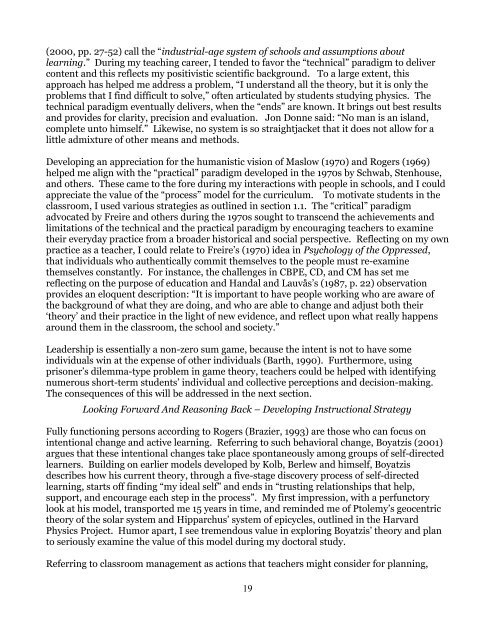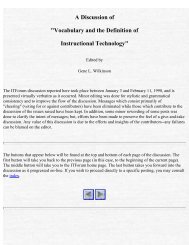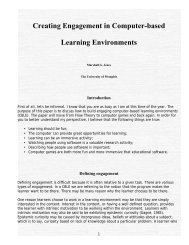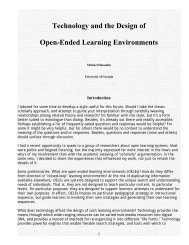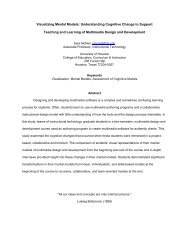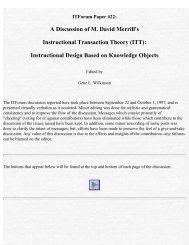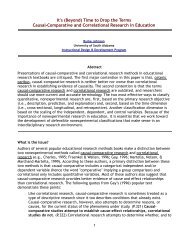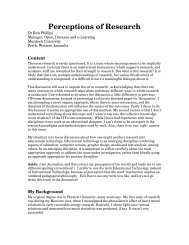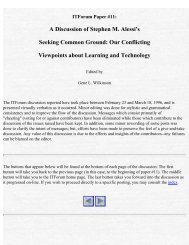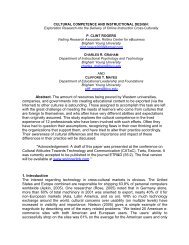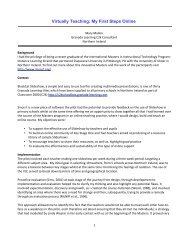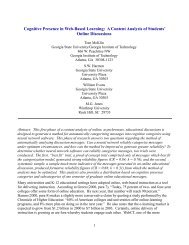SMART EDUCATION: BLENDING SUBJECT EXPERTISE WITH THE CONCEPT OF ...
SMART EDUCATION: BLENDING SUBJECT EXPERTISE WITH THE CONCEPT OF ...
SMART EDUCATION: BLENDING SUBJECT EXPERTISE WITH THE CONCEPT OF ...
You also want an ePaper? Increase the reach of your titles
YUMPU automatically turns print PDFs into web optimized ePapers that Google loves.
(2000, pp. 27-52) call the “industrial-age system of schools and assumptions about<br />
learning.” During my teaching career, I tended to favor the “technical” paradigm to deliver<br />
content and this reflects my positivistic scientific background. To a large extent, this<br />
approach has helped me address a problem, “I understand all the theory, but it is only the<br />
problems that I find difficult to solve,” often articulated by students studying physics. The<br />
technical paradigm eventually delivers, when the “ends” are known. It brings out best results<br />
and provides for clarity, precision and evaluation. Jon Donne said: “No man is an island,<br />
complete unto himself.” Likewise, no system is so straightjacket that it does not allow for a<br />
little admixture of other means and methods.<br />
Developing an appreciation for the humanistic vision of Maslow (1970) and Rogers (1969)<br />
helped me align with the “practical” paradigm developed in the 1970s by Schwab, Stenhouse,<br />
and others. These came to the fore during my interactions with people in schools, and I could<br />
appreciate the value of the “process” model for the curriculum. To motivate students in the<br />
classroom, I used various strategies as outlined in section 1.1. The “critical” paradigm<br />
advocated by Freire and others during the 1970s sought to transcend the achievements and<br />
limitations of the technical and the practical paradigm by encouraging teachers to examine<br />
their everyday practice from a broader historical and social perspective. Reflecting on my own<br />
practice as a teacher, I could relate to Freire’s (1970) idea in Psychology of the Oppressed,<br />
that individuals who authentically commit themselves to the people must re-examine<br />
themselves constantly. For instance, the challenges in CBPE, CD, and CM has set me<br />
reflecting on the purpose of education and Handal and Lauvås’s (1987, p. 22) observation<br />
provides an eloquent description: “It is important to have people working who are aware of<br />
the background of what they are doing, and who are able to change and adjust both their<br />
‘theory’ and their practice in the light of new evidence, and reflect upon what really happens<br />
around them in the classroom, the school and society.”<br />
Leadership is essentially a non-zero sum game, because the intent is not to have some<br />
individuals win at the expense of other individuals (Barth, 1990). Furthermore, using<br />
prisoner’s dilemma-type problem in game theory, teachers could be helped with identifying<br />
numerous short-term students’ individual and collective perceptions and decision-making.<br />
The consequences of this will be addressed in the next section.<br />
Looking Forward And Reasoning Back – Developing Instructional Strategy<br />
Fully functioning persons according to Rogers (Brazier, 1993) are those who can focus on<br />
intentional change and active learning. Referring to such behavioral change, Boyatzis (2001)<br />
argues that these intentional changes take place spontaneously among groups of self-directed<br />
learners. Building on earlier models developed by Kolb, Berlew and himself, Boyatzis<br />
describes how his current theory, through a five-stage discovery process of self-directed<br />
learning, starts off finding “my ideal self” and ends in “trusting relationships that help,<br />
support, and encourage each step in the process”. My first impression, with a perfunctory<br />
look at his model, transported me 15 years in time, and reminded me of Ptolemy’s geocentric<br />
theory of the solar system and Hipparchus’ system of epicycles, outlined in the Harvard<br />
Physics Project. Humor apart, I see tremendous value in exploring Boyatzis’ theory and plan<br />
to seriously examine the value of this model during my doctoral study.<br />
Referring to classroom management as actions that teachers might consider for planning,<br />
19


